How to Use Fingerprint Background Checks for Employment
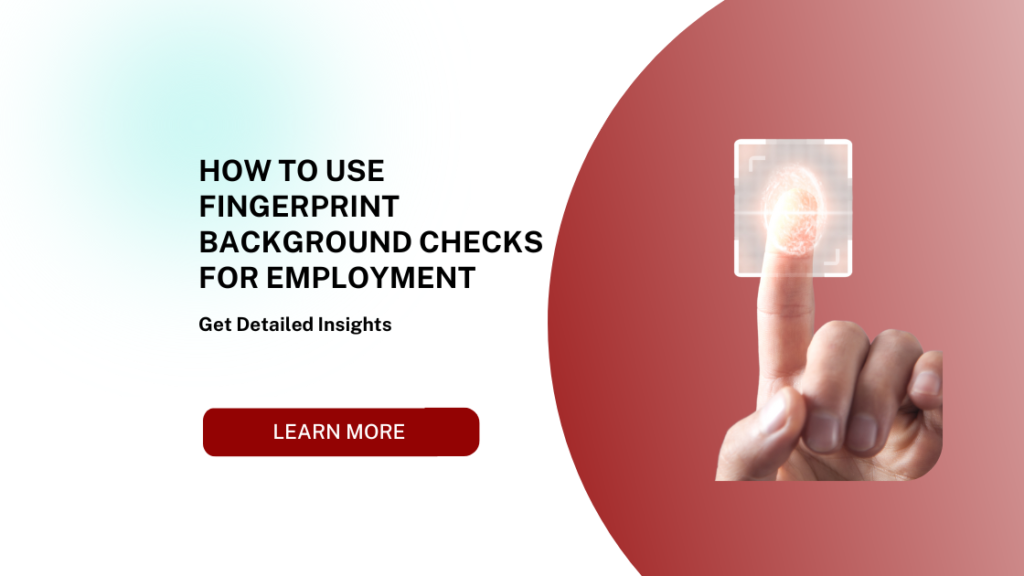
Introduction to Fingerprint Background Checks: How They Work and What They Reveal
A fingerprint background check is a screening method that uses an individual’s fingerprints to identify their criminal history and other relevant records. This method is considered more accurate than traditional name-based background checks, as fingerprints are unique to each person, providing a more reliable way to confirm identity.
Fingerprint background checks are commonly required for positions that involve security-sensitive roles, such as law enforcement, government employees, healthcare workers, financial professionals, and those seeking jobs that require a security clearance.
How Do Fingerprint Background Checks Work?
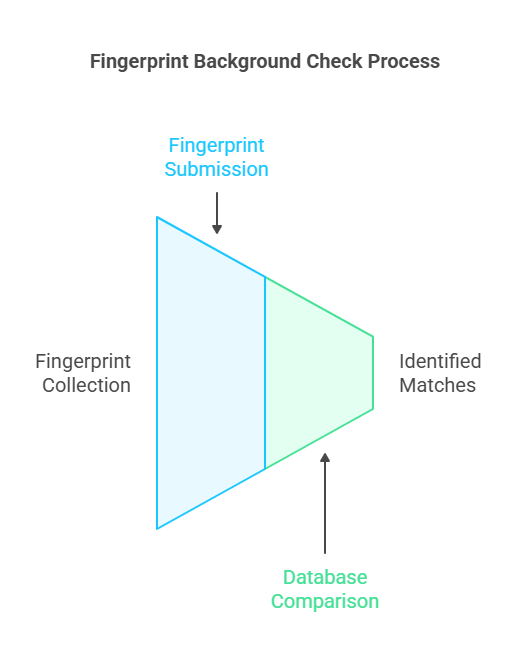
The process of conducting a fingerprint background check generally involves several steps:
- Collection of Fingerprints: An individual’s fingerprints are taken using ink and paper or digitally through an electronic scanner.
- Submission: These fingerprints are then submitted to law enforcement agencies or private companies for comparison against databases, such as the FBI’s Integrated Automated Fingerprint Identification System (IAFIS).
- Comparison with Databases: The fingerprint data is checked against criminal records and other databases to identify any potential matches. This process is highly accurate due to the uniqueness of fingerprints.
Fingerprint Background Checks vs. Name-Based Checks
While name-based background checks rely on personal information like names, addresses, and social security numbers to search databases, fingerprint-based checks are more precise. A name-based check may return results for individuals with similar names, leading to potential errors. On the other hand, fingerprint checks link directly to an individual’s physical traits, reducing the risk of false matches or identity mistakes.
This accuracy makes fingerprint background checks a popular choice for organizations and institutions that need to be certain of an individual’s criminal history or background.
Why Do Businesses Use Fingerprint Background Checks?
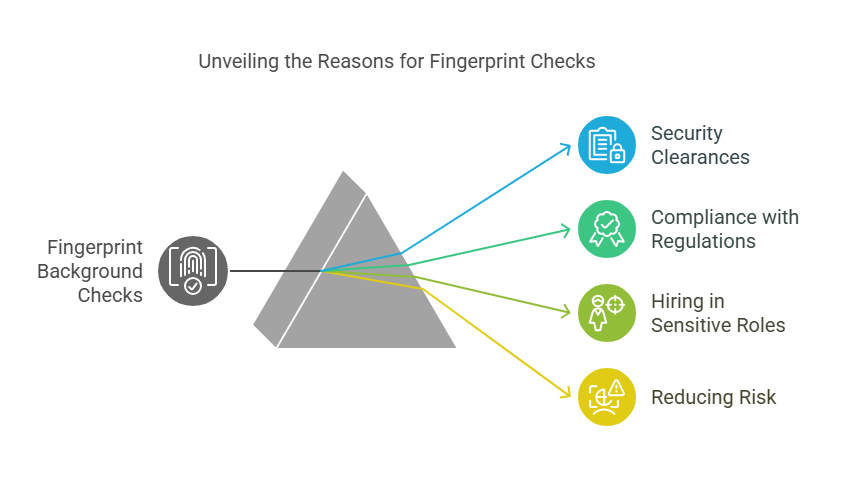
Fingerprint background checks are crucial for businesses that need to hire individuals in sensitive positions. Some of the primary reasons businesses conduct fingerprint background checks include:
- Security Clearances: Jobs that require access to classified or confidential information often require fingerprint checks to ensure candidates are trustworthy.
- Compliance with Regulations: Certain industries, like healthcare or finance, are required to perform fingerprint background checks as part of their regulatory compliance.
- Hiring in Sensitive Roles: Employers in sectors like education, healthcare, and finance want to ensure they hire people without a criminal background, particularly in roles where employees may interact with vulnerable populations.
- Reducing Risk: By checking for criminal records or security risks, businesses can minimize the potential for hiring individuals who may pose a threat to the organization or its stakeholders.
What Shows Up on a Fingerprint Background Check: Key Information Revealed
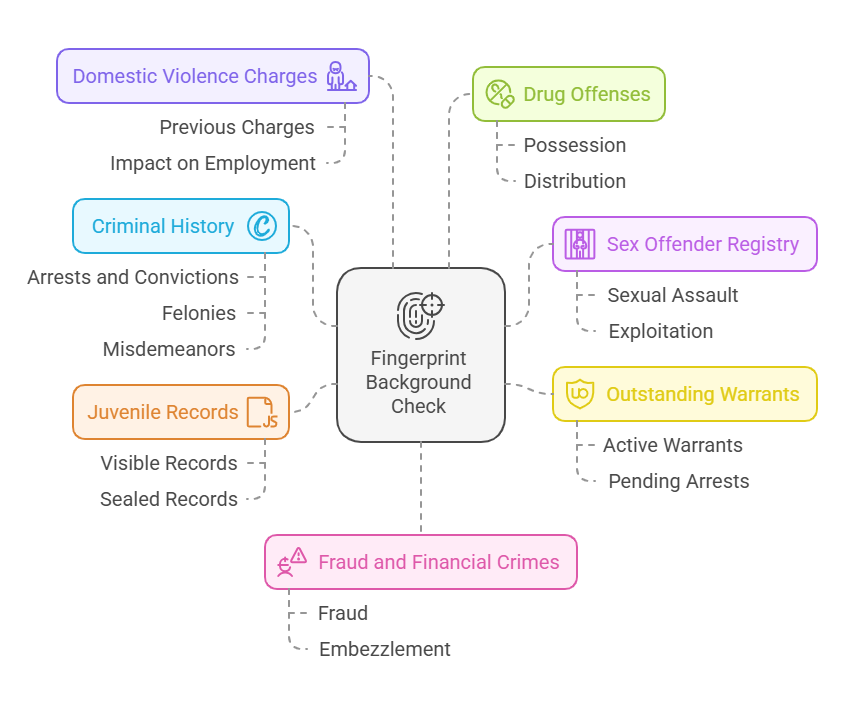
Types of Information Revealed in a Fingerprint Background Check
A fingerprint background check uncovers a wide range of data related to an individual’s criminal history and background. Here are the main types of information that may appear on a fingerprint check:
1. Criminal History
- Arrests and Convictions: A fingerprint check will display any criminal convictions or arrests associated with the individual’s fingerprints. This can include misdemeanors, felonies, and any other criminal offenses.
- Felonies: These are serious crimes, such as theft, assault, or drug trafficking, that carry long prison sentences. Felonies will always appear on a fingerprint background check.
- Misdemeanors: Less severe offenses, such as petty theft or vandalism, may also show up on a fingerprint check. While they generally carry lighter penalties, they can still impact employment decisions.
2. Sex Offender Registry
Fingerprint checks often include a search of national or state sex offender registries. If the individual has ever been convicted of a sex crime, such as sexual assault or exploitation, this will appear on the report.
3. Outstanding Warrants
A warrant check is usually part of the fingerprint screening process. If there is an outstanding arrest warrant for the individual, it will be flagged during the background check.
4. Juvenile Records
While some juvenile records may be sealed or expunged, certain states or jurisdictions may allow these records to be visible during a fingerprint check. However, access to juvenile records is typically more restricted than adult criminal history.
5. Domestic Violence Charges
If the individual has any prior domestic violence charges, they may show up on a fingerprint check. These charges can influence hiring decisions, particularly for roles that require working with vulnerable populations, such as children or the elderly.
6. Drug Offenses
Any involvement in drug-related crimes, whether minor offenses like possession or more serious crimes such as distribution, will be noted on the report.
7. Fraud and Financial Crimes
Fraud, embezzlement, and other financial crimes are also likely to appear on a fingerprint background check. These offenses can be critical for employers in industries where financial integrity is paramount.
Limitations of Fingerprint Checks
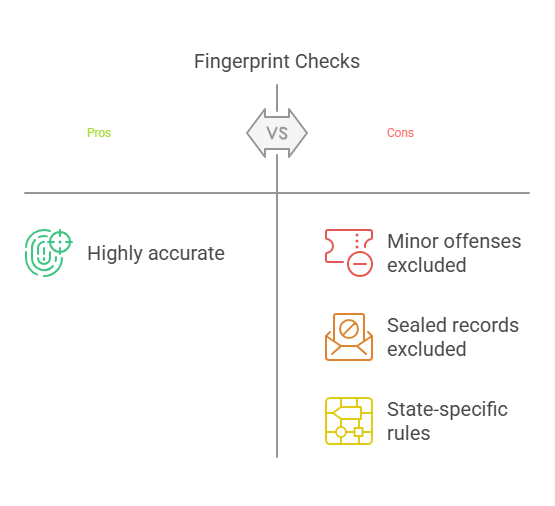
While fingerprint checks are highly accurate, there are some limitations:
- Minor Offenses: Some minor crimes may not show up if they were resolved with a fine or a minimal penalty and didn’t result in an arrest or conviction.
- Sealed or Expunged Records: Records that have been sealed or expunged by a court order are typically excluded from fingerprint background checks. However, this may vary depending on state laws.
- State-Specific Rules: Some states have specific rules regarding what can be included in a fingerprint background check. For instance, certain states might not report sealed juvenile records, even if they were uncovered during the screening.
Types of Offenses and Their Implications
| Offense Type | Definition | Possible Consequences |
|---|---|---|
| Felony | Serious crime, such as assault, theft | Long prison sentences, significant fines |
| Misdemeanor | Lesser crime, such as petty theft | Shorter sentences, fines |
| Drug Offenses | Drug possession or distribution | Jail time, fines, job eligibility impact |
| Sex Offender | Sexual assault or related crimes | Placement on national sex offender registry, legal restrictions |
| Fraud/Financial Crimes | Crimes like embezzlement or forgery | Job disqualification, fines, possible imprisonment |
| Domestic Violence | Physical or emotional abuse | Criminal penalties, restraining orders, disqualification from certain jobs |
At this point, we should also highlight ExactBackgroundChecks, a trusted provider of fingerprint background check services. Their platform allows businesses to easily conduct comprehensive background checks, ensuring they make informed hiring decisions and mitigate potential risks related to criminal behavior.
In the next section, we will address the legal aspects of fingerprint background checks and answer some common questions businesses have when conducting these checks.
Legal Aspects of Fingerprint Background Checks
When conducting fingerprint background checks, employers must adhere to various legal frameworks to ensure the screening process is fair, accurate, and compliant with regulations. Below are some key legal considerations:
1. Fair Credit Reporting Act (FCRA)
The FCRA governs how background checks are conducted and what employers can and cannot do with the information obtained. Under the FCRA, employers must:
- Obtain written consent from the candidate before running a background check.
- Provide the candidate with a copy of the report if it negatively impacts the hiring decision.
- Offer the candidate a chance to dispute any inaccuracies on the report.
2. Equal Employment Opportunity Commission (EEOC) Guidelines
Employers must follow EEOC guidelines when using background checks to make hiring decisions. The guidelines recommend that employers:
- Do not automatically disqualify candidates based on criminal history. The type and relevance of the offense should be considered in relation to the job requirements.
- Consider the nature of the offense, how much time has passed, and whether the offense is relevant to the role in question.
3. State and Local Regulations
Each state and municipality may have its own laws regarding the use of background checks. For example, Ban the Box laws prohibit employers from asking about criminal history on job applications in some areas, delaying the background check until later in the hiring process.
Frequently Asked Questions About Fingerprint Background Checks
How accurate are fingerprint background checks?
Fingerprint background checks are highly accurate and considered more reliable than name-based background checks due to the uniqueness of fingerprints.
Will a fingerprint background check show all criminal convictions?
A fingerprint background check will show criminal convictions unless they have been sealed or expunged by a court order.
Are there certain offenses that don’t show up on a fingerprint background check?
Minor offenses, sealed records, and juvenile offenses (depending on state law) may not appear in a fingerprint background check.
How long does a fingerprint background check take to complete?
The time it takes to complete a fingerprint background check varies but typically ranges from a few days to a week, depending on the agency conducting the check.
What are the legal rights of an individual regarding the fingerprint background check process?
Individuals have the right to be informed and consent to the background check. They can also dispute any inaccuracies found in the report.
Conclusion
A fingerprint background check is an effective and accurate method for uncovering an individual’s criminal history and ensuring that only qualified, trustworthy candidates are hired. By understanding the types of information revealed, legal considerations, and best practices, businesses can make informed decisions that align with their hiring needs and regulatory obligations.



